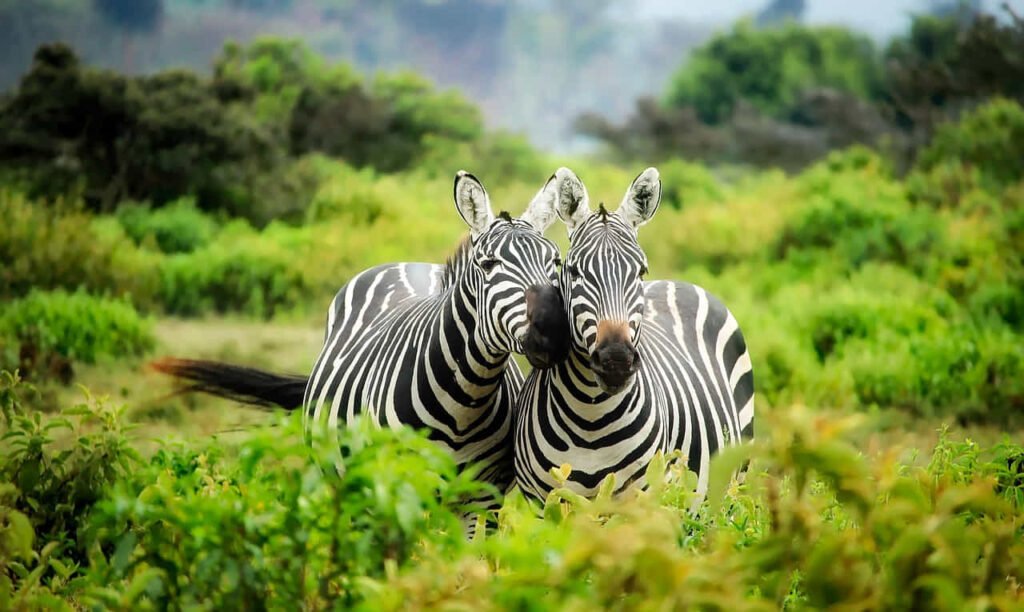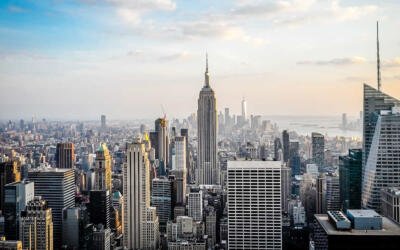Kenya offers a warm tropical climate, sandy beaches, and rich African culture. It is also home to many national parks that are home to the big five and numerous other animals.
Indeed, Nairobi, the capital city, is the only city anywhere in the world that borders a national park.
As a city resident, one moment, you could be having a business meeting in a boardroom in one of the tallest buildings in Africa, and a few minutes later, you could be watching elephants, giraffes, and leopards in their wildest natural habitat.
Table of Contents
- 1 Visa application
- 2 Cities and towns popular with digital nomads
- 3 Security and safety
- 4 Cultural and social norms
- 5 Political and economic stability
- 6 Language and language barriers
- 7 Health and Vaccination
- 8 Electronic standards
- 9 Telephone
- 10 Payment services and infrastructure
- 11 Transport infrastructure and services
- 12 Climate and seasons
- 13 Cuisine
- 14 Tax requirements on digital nomads
- 15 Health service and Insurance Options
- 16 Common concerns

It is important to note that Kenya is the world’s third largest tea producer, after China and India. The country also produces coffee. Some tea and coffee farms are about an hour’s drive north of the Nairobi city center.
Indeed, you can easily visit the farms in Limuru and witness the plucking of tea leaves and coffee berries and their processing.
Visa application
If you are from any member state of the East Africa Community (EAC), you do not need to apply for a visa to visit Kenya. Meanwhile, as a traveler from outside the region, you can apply for a single tourist visa covering Kenya, Uganda, and Rwanda.
Visa available for digital nomads
Kenya does not issue a special visa for digital nomads. With that stated, the other options available can allow you to stay in the country for an extended period while you work remotely.
The single-entry visa
This is a general-purpose visa issued to persons visiting for business, tourism, and medical care reasons. You need a passport valid for more than six months and a return ticket to qualify for this visa. It is valid for three months but can easily be renewed.
East Africa Tourist Visa
With the East Africa Tourist visa, you can travel and stay in Kenya, Rwanda, and Uganda. Like the single entry visa, it is valid for three months and can be renewed.
The process of applying for a Visa
You can apply for the Kenyan single entry and the East Africa tourist visa through the Evisa online portal. You get feedback on the success of your application within 48 hours.
Requirements to qualify for Visa
The requirements for applying for a visa include the following:
- Travel itinerary.
- Hotel or accommodation booking.
- Return air ticket
- Valid passport and biodata page.
- A photograph.
The Cost of applying for a visa
The applicant is required to pay $51, which is payable through debit and credit cards.
Cities and towns popular with digital nomads
Kenya has four major cities; Nairobi, Mombasa, Kisumu, and Nakuru. However, Nairobi and Mombasa are the most attractive to local and foreign travelers and tourists.
Other destinations popular with travelers are the coastal towns of Lamu, Malindi, Watamu, and Diani. Tsavo, Maasai Mara, Amboseli, and other game reserves and national parks also attract many visitors.
The Nairobi City

Nairobi has a population of close to 5 million. It is the largest city in East and Central Africa and the most developed.
Cost of living in Nairobi
Nairobi, Kenya, is the most expensive city in Kenya, also in the region. However, it is generally far less expensive compared to cities in Europe, North America, and Asia.
According to Numbeo, an online platform that tracks and compares the cost of living across the globe, the cost of living in Kenya is, on average, 115.91% lower than in the United States.
A meal in an inexpensive restaurant will cost between $3 and 10$. According to data from Nomad List, it costs an average of about $1700 a month for a digital nomad to live in the city.
Accommodation
The accommodation cost in Nairobi depends on the neighborhood you choose to stay in. It can be as low as $200 a month to as high as $5000. If you choose to stay in the cheapest parts of town, you must compromise on your comfort and ease of movement, especially at night.
It might mean that you limit your foray outside at night. It also means staying mostly with locals and less with other foreigners. The cheapest places you can stay are along Thika road and Mombasa road.
You can strike a middle ground and find a great apartment in a neighborhood that affords you a little more comfort, freedom to explore the city’s nights, and the opportunity to hang out with a larger foreign crowd. Kilimani and Westlands are examples of such areas.
If you are okay with spending above $2000 on rent, you can stay in Karen, Runda, Muthaiga, and Lavington. These are some of the most expensive neighborhoods.
Some secure and more comfortable areas but not extremely expensive include Kilimani, Kileleshwa, Mombasa road, and some parts of Westlands estate.
Generally, rent in Kenya is 515.51% lower than in the US.
Internet in Nairobi
Much of the city has access to a reliable broadband connection. The average download speed is about 8 Mbps. However, you can get speeds exceeding 100 Mbps with a little cost.
The cost of an unlimited internet connection ranges from 20$ to 100$ a month. Zuku, Safaricom, and Jamii Telecommunications are the three major internet service providers.
You can also use mobile data, which can cost about $1 for 1GB. The most reliable mobile data is by Safaricom. Other options include Airtel and Telekom.
Best coworking spaces
Of all towns in Kenya, Nairobi had the most co-working spaces. Indeed, the list exceeds 70. The most notable are the Nairobi Garage, iHub, and Nailub. Besides providing working desks, these spaces serve as startup incubators and host technology entrepreneurship events. iHub, in particular, hosts many blockchain and crypto events.
The cost of using the spaces ranges from $100 for a desk to $2000 for a private office.
Recreation in Nairobi
The recreational activities in Nairobi include going to nightclubs in Westlands and Kilimani. The most popular nightclub in Westlands and one of the oldest is K1 Clubhouse. In Kilimani, there is Kulture Restaurant & Lounge.
You can also rent a car or pay a tour company to drive you through the expansive Nairobi national park and watch the wildlife in their natural habitat with a backdrop of the city.
Next to the entrance to Nairobi national park is the Giraffe Center, where you can go and feed the giraffes and take selfies with them. You can also visit nearby Ngong hills and climb the terrain covered with wind turbines, do ziplining, ride bikes or even horses.
To the North of the city are tea and coffee farms you can visit to learn how to pluck the leaves and the berries and watch the processing. If you have a young family, you can visit the Two Rivers theme park and enjoy the fun outdoor activities.
The Coastal City of Mombasa

Mombasa is the second city, with a population of about 1.5 million. It is also the oldest ongoing city in Mombasa. It was first built in 900 AD. Over the centuries, the Arabs and Portuguese occupied it as a trading center.
Today the biggest economic activity in the city is still trade facilitated by the port that serves much of East and central Africa. Mombasa is also a popular tourist destination thanks to the beautiful beaches and the warm weather throughout the year.
Cost of living
Mombasa is less costly compared to Nairobi. The cost of food is slightly higher because, unlike Nairobi, much of it has to be transported from farms a little further.
Accommodation
Mombasa is home to many five-star hotels and accommodations for travelers. The most expensive are beach resorts along the coast. The most notable include Sarova Whitesands Beach Resort & Spa, PrideInn Paradise Beach Resort and Spa, and Severin Sea Lodge.
Besides hotels, one can rent apartments through local agents and Airbnb. The most opulent estates include Nyali, Bamburi, and Kizingo. Monthly rent for apartments in these estates costs between $500 to $2000.
Internet in Mombasa
Like Nairobi, Mombasa had reliable internet speeds similar to those you can get in the capital city.
Best coworking spaces
Mombasa has a few co-working spaces, just like Nairobi. However, you are likely to meet as many entrepreneurs and startups as you are likely to meet in the Nairobi coworking spaces. The most popular coworking spaces in the coastal city include MombasaWorks, Close the gap Hub, and Jasiri.
Recreational activities in Mombasa
Mombasa is a coastal town, so you have a list of sea-related activities you can engage in. That includes sunbathing at the beach, water riding, snorkeling, surfing, and deep sea/coral exploration. Notable beaches include Nyali, Diani beach, and Bamburi beach.
Other towns you could visit and stay in include Malindi, which has a significant Italian population. There is also Diani and Lamu, both found along the coast.
Security and safety
As long as you know where to go and areas to avoid, you are mostly safe in Kenya. In Nairobi and Mombasa, you must stay within the areas frequented by foreigners. If you need to go on to the least traveled path, be in the company of local friends.
For Nairobi, keep much of your schedule, especially at night in areas like Kilimani, Westlands, and Karen.
Crime against foreigners
Kenya receives over two million visitors every year, mostly arriving as tourists. It is also home to many foreigners working for international bodies, including the UN.
Nevertheless, the number of crimes against foreigners is negligible. And when it happens, law enforcement takes it seriously, as tourism is a major foreign exchange earner.
Dos and don’ts
- Keep your valuables, such as cameras, watches, and jewelry, out of sight in public, especially in the CBD.
- Try to avoid places where you stand out because of your race or nationality, or find a local to be your guide.
- At night stay in the more affluent and secure parts of town.
Solicitation for financial help
As a foreigner, you should know that locals, especially those from low-income areas, might see you as a potential donor. Some might actively solicit financial help from you.
When this happens, make it abundantly clear that you can’t help out. If you provide some financial help, let it be known that it came from a personal sacrifice.
Kenya is a country with diverse cultures and customs. Over 40 distinct cultural communities are living in the country. While in the major cities and towns, you might not need to significantly alter how you express yourself.
When visiting rural villages, it is important to understand that most people are generally very conservative. This is, however, not the same way. For example, women might be required to cover their heads when visiting the North Eastern parts of the country. This is not a requirement in the rest of the country.
Religious composition
According to data from the Kenya National Bureau of Statistics (KNBS), about 85% of Kenyans identify as Christians and 11% as Muslims. The other religion that registers presence in the country is Hindu, at about 2%.
Cultural dos and don’ts
- Respect people’s beliefs, as most Kenyans hold their beliefs strongly. It is better to keep off religious topics, especially if you don’t share their faith.
- Also, avoid political topics, as you might offend those you interact with without notice.
- Wear modest clothing when in public, especially if you visit the villages.
Political and economic stability
Kenya is the largest economy in East Africa. It has a per capita income of $4370. About 35% of the population lives under the poverty line set by the World Bank.
The nature of politics and government
An elected president heads the government. The elections are held every five years. The elections are often highly competitive, and during the days before and after, the economy tends to come to a standstill during the days before and after.
Following the post-election violence in 2007, in every election, foreigners tend to leave the country before elections and return when the new government has been formed. That is to avoid getting stranded in the country due to violence or instability.
Language and language barriers
Kenya is a former British colony. English is an official language, and up to 50% of the population can speak it fluently.
National language
Kiswahili is the national language, and nearly everyone can speak it. Over 200 million individuals speak Swahili in Kenya, Tanzania, Uganda, Rwanda, Burundi, and the eastern parts of the Democratic Republic of Congo.
Other languages spoken widely
Over 46 ethnic groups live in Kenya, each of which has its native language. Some of the ethnic languages most spoken in Kenya include Kikuyu, Luo, Kamba, and Kalenjin.
That means you will likely face a new language every time you visit different parts of the country. Nevertheless, English is sufficient, especially if your stay is confined to the cities and towns. If you want to interact further with the locals, especially outside the major urban centers, learning a bit of Swahili can take a long way.
Health and Vaccination
You can get world-class medical service in the major cities of Nairobi, Mombasa, and Kisumu. Some major hospitals include Nairobi hospital, Aga Khan hospital (in Nairobi and Mombasa), and the Karen hospital.
Common infectious diseases
The common infectious diseases in Kenya include Malaria and yellow fever.
The city of Nairobi is invaded by mosquitoes, especially in the wet months of April, May, and June. Incidentally, the mosquitoes of Nairobi hardly spread malaria.
However, you are likely to catch malaria in Kisumu and Mombasa. Therefore, you must make sure you sleep under mosquito nets, use repellants and take preventive Malaria medicine.
How to protect yourself from common diseases
Before traveling to Kenya, take prescription medicine to prevent you from being infected with malaria. Your doctor will recommend the medicine you must take before and during your stay in the country.
Other recommended vaccines
The CDC recommends several vaccinations for individuals visiting Kenya. The list includes yellow fever, polio, chickenpox, diphtheria, measles, shingles, rabies, meningitis, typhoid, and cholera.
Electronic standards
Most of the electronics used in the country are made in Asia. It might be difficult to get repair services for devices popular in the US, such as Apple products. You will likely get the services in Nairobi, but it can be very difficult in other towns.
The standard voltage is 240 V, with the frequency set at 50 Hz. Even with that being the case, appliances designed to work with voltage within the range of 220 – 240 V can work in the country with little issues. Those that use other standards can only be used through a converter.
Telephone
Most hotels and apartments you might rent will already have broadband internet installed. The major service providers include Safaricom, Zuku, and Jamii Telecom.
Meanwhile, Safaricom, Airtel, and Telekom are common mobile service providers. Safaricom has the most widespread coverage in the country.
How to register for a Sim card
To get a sim card, you need to buy it from an official service provider store. You need to provide a government-issued identification document, such as a passport, to register the sim card.
Mobile phone plans and cost
The average cost of making calls is about 2-3 cents per minute across all networks. You can load your sim card using scratch cards more conveniently from your mobile money wallet.
Payment services and infrastructure
Kenya has a highly developed financial system. It is often cited as a country where technology has been successfully used to achieve financial inclusion.
Popular domestic payment services
Before you arrive, it is necessary you understand that you can only survive in Kenya with a mobile money wallet. You will use it to make the most critical payments, such as taxi fares, grocery shopping, and utilities.
Your sim card comes registered with a mobile money wallet. The most used mobile wallet is Mpesa by Safaricom. The wallet is accessible through tools on your sim card. It can also be accessed through a mobile app you can install on your smartphone.
Accessible international payment services
The international payment methods you can use include Visa and Mastercard payment cards. You can also open a local bank account and accept wire transfers.
PayPal works in the country. There is even an online service to convert your money in PayPal into Kenyan shillings and move it to your Mpesa mobile wallet. One bank, Equity Bank, the withdrawal from PayPal to a bank account.
Local banks do offer dollar and Euro accounts. As a digital nomad, however, it is more convenient to use an international dollar or Euro account like those offered by ClubSwan. This saves you from opening new accounts when you move on to the next country on your schedule.
The local space
You can also buy and sell crypto in the country. Besides, ClubSwan’s most accessible marketplaces are the peer-to-peer exchanges Local Bitcoin and Paxful.
According to reports published by the blockchain research firm Chainalysis, Kenya is one of the three countries in Africa with the highest crypto trading activity. The others are Nigeria and South Africa.
The country is also among the top three on the continent that receives the most investment for blockchain startups. According to the African Blockchain Report prepared by the Standard Bank, Kenyan blockchain startups received about 16% of the funding that came to the continent, behind only Nigeria (40%) and Seychelles (27%).
Indeed, there is a huge and growing crypto community in the major cities of Nairobi and Mombasa. You are most likely to discover a crypto-related event hosted in the two cities every week on platforms like Meetup and Eventbrite.
Currencies and exchange rates
The local currency is known as the Kenya shilling. A dollar gives you about 115 Kenya shillings.
Transport infrastructure and services
The transport infrastructure in the major cities of Nairobi, Mombasa, Kisumu, and Nakuru is well-developed. That includes roads, railways, and air transport.
With that stated, traffic congestions are common, and it is often difficult to keep time as you never know how much time your commuting from one point to another might take. Therefore, it is important to make allowance for time lost, especially in the morning and evening.
Availability and reliability of public transport
Public transport is mainly through minibusses known as matatus. They are cheap as they often charge less than a dollar to all destinations within the city. However, they can be slow, especially as they don’t work on an established schedule, depending on how fast the crew can get them full.
Taxi services
Taxi-hailing apps work in major cities. The most used are Uber, Bolt, and InDriver. However, most drivers using these apps don’t like accepting payments through payment cards.
Indeed, they might cancel your ride if they find out you plan to pay using a payment card. So before you use a taxi, ensure you have cash or, preferably, funds in your mobile money wallet (Mpesa).
Climate and seasons
Kenya lies on the equator. That means it is generally warm throughout the year. However, there is a variation throughout the year, especially depending on the altitude of where you are.
While Mombasa and other towns along the coast generally remain warm throughout the year, towns and cities on higher altitudes, such as Nairobi and Nakuru, can be chilly in June, July, and August.
Meanwhile, the month of April and May and also October and November are wet months.
Cuisine
Kenyans eat different foods depending on their ethnic background. For example, people from western Kenya and those who live along the rift valley eat a form of cake made from corn flour called ugali. This is normally served alongside greens or meat, or fish stew. Meanwhile, those from central Kenya eat mashed potatoes and boiled corn and beans as a staple food.
In the major cities, you will find all these different types of foods. Kenyans generally like to eat roasted meat, known as Nyama Choma. It is often served with ugali.
In the major cities and towns, you will also have access to restaurants that offer cuisines from different parts of the world.
One common complaint about Kenyan food is that it is not heavy on spices, however, if you visit restaurants that serve Indian cuisine, that is not the case.
Tax requirements on digital nomads
Since Kenya has no digital nomad visa, and the one you are likely to use is that of a tourist, you are not expected to pay any taxes on your revenue from clients outside the country.
The only time you might be expected to pay taxes is after you have applied and gotten a work permit.
Health service and Insurance Options
If you plan to stay in the major cities of Nairobi and Mombasa, you can access many hospitals and clinics. The public facilities are cheaper but are often not well-resourced. Private hospitals are ideal, especially if you have medical insurance coverage. The most popular hospitals include Nairobi, Nairobi West, Aga Khan, and MP Shah.
As a short-term visitor, you are better off coming while covered by insurance from elsewhere, these are acceptable in the major hospitals, especially if they have local partners. If you get a long-term residence in the country, there is a long list of insurance service providers.
Common concerns
The common concerns for people visiting Kenya include the following:
- Likelihood of catching malaria
- Unreliable public transport
- The expectation of the locals to receive financial help from travelers
With that stated, Kenya has the necessary infrastructure to make your stay as a digital nomad comfortable. It also has a long list of destinations and activities you can engage in to make your stay unforgettable.
Club Swan Disclaimer: The information provided is not tax and/or legal advice. The statements do not constitute legally binding offers. The company does not guarantee or endorse any third-party links, websites, or goods and/or services. Seek your own professional advice.




